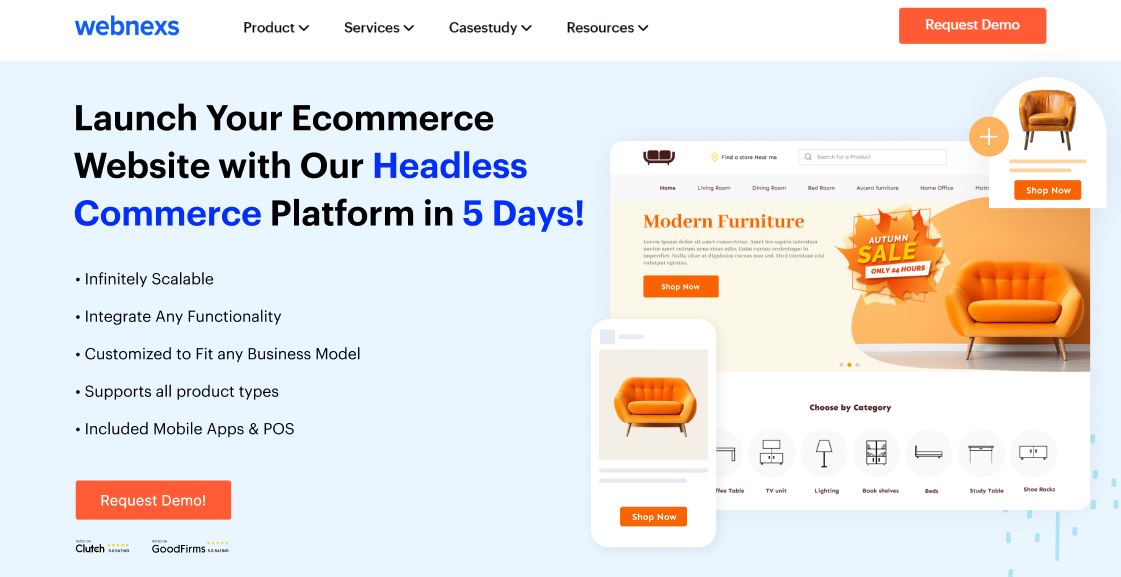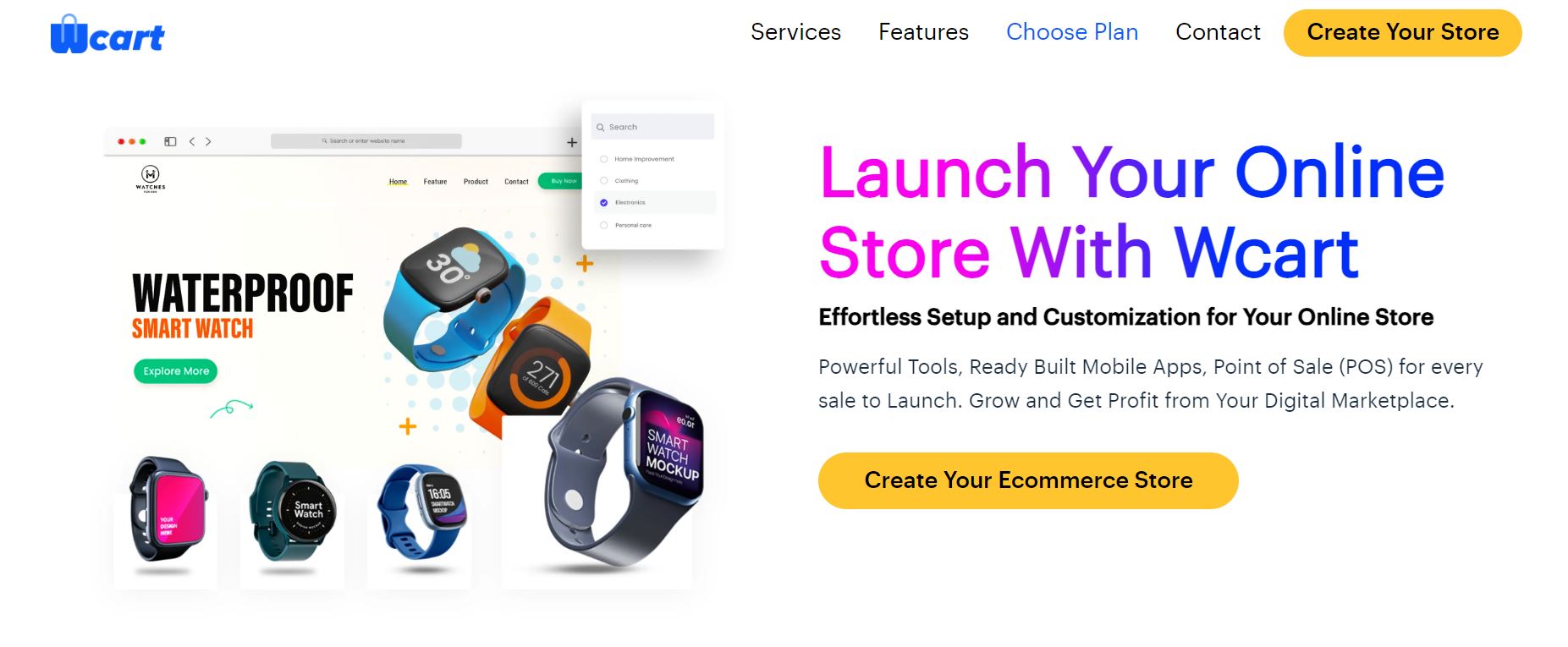Online retail continues to expand, with projections indicating that nearly a quarter of all retail transactions will occur online by 2026. For small businesses, this underscores the importance of establishing an online presence. Fortunately, setting up an online store is straightforward with the right tools. A reliable ecommerce website builder enables businesses to list products, process payments, and manage shipping effortlessly from their store or home office.
Ecommerce Industry Overview
There is always scope for digitization that makes our lifestyle more comfortable and time-efficient. Considering this view, let’s go through some figures that underscore the significance of the E-commerce storefront business model. With increasing innovation in AI and ML in this field, the seamless shopping experience can be enhanced greatly. A minimalistic approach in these developments is revolutionizing the industry, making voice commerce increasingly prevalent among customers.
The industry is currently worth a whopping $8.80 trillion and is expected to grow two times the existing value by 2029. For the forecast period 2024-2029, it is predicted to grow at a CAGR of 15.80%. This directly reflects the industry’s revenue-generating capacity which attracts new players into the market. A high potential market with the right target audience is the two optimal factors for a prospective business idea.
Alibaba , a Chinese E-commerce giant currently holds the highest market share of 23%, yet by the year 2027, US-based Amazon is predicted to lead the market with $1.7 trillion in e-commerce sales.
Onboard with the right e-commerce site builder to leverage market potential. For subsequent growth in this industry, partnering with the right solution provider becomes a key factor in determining the efficiency of your site, which serves as the face of your e-commerce business. This ensures that your site is convenient for users to navigate and acts as a persuader for online sales conversion.
What is Ecommerce Website Builder?
An ecommerce website builder represents the simplest approach to creating an online store and enhancing brand visibility without any coding knowledge. Whether businesses intend to sell physical goods or offer services like online courses, such a platform facilitates effortless setup and operation.
Which Types of Businesses Benefits from Using an Online Store Builder?
Businesses of all sizes and industries benefit from online store builders. From small startups looking to establish an online presence to large enterprises aiming to expand their digital footprint, ecommerce website builders provide the necessary tools and features to cater to diverse business needs.
What Makes the Best Ecommerce Website Builder?
For enterprise or small and medium businesses wanting to sell products online, I looked for five essential features in ecommerce website builder.
- Ecommerce website builder needed to be user-friendly, allowing anyone to create appealing online stores without specialized skills. Compatibility with existing brand materials was crucial, eliminating platforms with limited themes.
- They had to support digital and physical products, manage sales taxes, and handle international shipping, especially important for small businesses with tax obligations or international sales.
- Only full-service ecommerce platforms were considered, ensuring they could handle all aspects of online selling without relying on additional services.
- Integration with other business apps was essential, requiring platforms to offer a variety of integrations for seamless operations.
- Affordability was key, with transparent monthly pricing and no hidden fees, ensuring accessibility to small and medium businesses.
Read More: Build an Ecommerce Marketplace Website like Amazon
Jargons in E-commerce Site Building
1. API:
It is required for communicating between various software applications. Interoperability is an essential feature of API and is imperative for an E-commerce website to integrate with payment gateways, and other functionalities associated with the core operations for organizing a seamless process.
2. CMS:
It manages and organizes content that is put up on the site and that is available for visitors to consume. This facilitates a user-friendly interface and content updates quickly primarily, enabling a hassle-free user experience.
3. Middleware:
It is a software deployed to enable communication and data management between software applications where they act as an intermediary. In the absence of this, processes become complex and time-consuming.
4. Secure sockets Layer:
Data shared over the website gets encrypted to protect it from breaching. Since data is sensitive, confidentiality is given utmost importance.
5. Load Balancing:
Distributing traffic to multiple servers to prevent overloading. It is essential to avoid poor performance, increased downtime, and security issues. It can be executed through software, firmware, and hardware.
6. Webhook:
It is a method used to notify other e-commerce systems to initiate processing the order. Operating without this leads to severe delays in order fulfillment as real-time communication will be entirely disrupted to process quickly.
How To Choose the Best Website Builder With Ecommerce for Your Online Store
Each ecommerce website builder and plan offers unique features tailored to different business needs, so it’s essential to assess what aligns best with your priorities.
- Consider your business type, size, and product offerings. Ensure the website builder supports your specific requirements, such as selling digital products or online courses.
- Set a budget and factor in scalability. Look for a solution that remains affordable over time, considering potential price increases and additional costs like apps or templates.
- Evaluate your confidence in building an online store. Choose a builder with a user-friendly drag-and-drop editor and intuitive backend dashboard for ease of use.
- Determine where you want to sell your products. Opt for a builder that supports multichannel selling, enabling seamless synchronization between your website, social media channels, and in-person sales.
- Focus on serving your customers effectively. Check available payment options and consider features for enhancing the sales funnel, like navigation, email marketing tools, and customer engagement features such as contact forms and social media integration.
How Much Does an Ecommerce Website Cost to Build?
The cost of building an ecommerce website varies depending on factors such as the chosen platform, customizations, additional features, and developer fees. On average, businesses can expect to invest anywhere from $1000+ to $5000+ in building their ecommerce website.
8 Best Ecommerce Website Builder Companies To Build Your Online Store
Selecting the appropriate ecommerce website builder companies is essential for establishing a successful online store.
- Webnexs
- Wcart
- Shopify
- Wix
- BigCommerce
- Magento
- WooCommerce
- Squarespace
Let’s explore the top 8 options available in the market today.
Webnexs
 Webnexs is a leading ecommerce website builder known for its comprehensive solutions and user-friendly interface. With Webnexs, businesses can create stunning online stores that are fully customizable and tailored to their specific needs.
Webnexs is a leading ecommerce website builder known for its comprehensive solutions and user-friendly interface. With Webnexs, businesses can create stunning online stores that are fully customizable and tailored to their specific needs.
Key Features:
- Advanced product management tools
- Secure payment options
- SEO-friendly features for better visibility
- Mobile-friendly design for the best viewing experience on all devices
- Outstanding customer support to help with any questions or problems
Benefits:
- Enables businesses to build a robust online presence
- Increases sales and revenue with advanced ecommerce features
- Provides flexibility and scalability to accommodate business growth
- Offers peace of mind with reliable security features and ongoing support
- Enhances customer experience with intuitive design and navigation
With its robust features and customizable solutions, Webnexs is an ideal choice for businesses looking to build a successful online store. Discover the power of ecommerce with Webnexs and elevate your business.
Wcart
 Wcart is a versatile ecommerce website builder known for its intuitive design and robust features. It provides users with an easy-to-use platform to create professional-looking online stores without coding knowledge.
Wcart is a versatile ecommerce website builder known for its intuitive design and robust features. It provides users with an easy-to-use platform to create professional-looking online stores without coding knowledge.
Key Features:
- Drag-and-drop website builder for effortless customization
- Integrated payment gateways for secure transactions
- Multi-language and currency support for global reach
- Built-in SEO tools to enhance online visibility
- Analytics dashboard for monitoring sales and performance metrics
Benefits:
- Simplified website creation process with drag-and-drop functionality
- Secure payment processing to instill trust and confidence in customers
- Expanded market reach with multi-language and currency support
- Improved search engine rankings with built-in SEO features
- In-depth analytics for informed decision-making and optimization
Wcart offers a user-friendly solution for businesses seeking to establish an online presence. With its intuitive design tools and powerful features, Wcart empowers users to create successful ecommerce websites with ease.
Shopify
 Shopify is a leading ecommerce platform known for its user-friendly interface and extensive range of features. Since its inception in 2006, Shopify has helped millions of businesses worldwide to build and expand their online presence.
Shopify is a leading ecommerce platform known for its user-friendly interface and extensive range of features. Since its inception in 2006, Shopify has helped millions of businesses worldwide to build and expand their online presence.
Key Features:
- Easy-to-use drag-and-drop website builder
- Extensive library of customizable templates
- Secure payment processing with Shopify Payments
- Integration with over 6,000 apps and plugins
- 24/7 customer service is available via phone, email, and live chat
Benefits:
- Simplified website creation process, even for beginners
- Professional-looking storefronts with customizable templates
- Seamless integration with third-party apps for added functionality
- Secure payment processing to protect customer data
- Personalized customer service available to address any questions or issues
With its user-friendly interface and robust features, Shopify is an excellent choice for businesses of all sizes looking to create an online store. Whether you’re a beginner or an experienced ecommerce entrepreneur, Shopify provides the tools and support you need to succeed.
Wix
 Wix is a popular website builder known for its simplicity and versatility. Founded in 2006, Wix has become a go-to platform for individuals and businesses looking to create stunning websites without coding knowledge.
Wix is a popular website builder known for its simplicity and versatility. Founded in 2006, Wix has become a go-to platform for individuals and businesses looking to create stunning websites without coding knowledge.
Key Features:
- Drag-and-drop website builder with customizable templates
- Built-in ecommerce functionality with secure payment processing
- SEO tools to improve online visibility and rankings
- Responsive design for ideal viewing on any device
- App Market with hundreds of apps to enhance website functionality
Benefits:
- Intuitive drag-and-drop interface for easy website creation
- Integrated ecommerce features for selling products online
- Improved search engine visibility with built-in SEO tools
- Easy integration with third-party applications to enhance functionality
- Mobile-responsive design ensures a consistent user experience across devices
Wix offers a versatile platform for building professional-looking websites with ease. With its drag-and-drop interface and extensive features, Wix is an excellent choice for businesses looking to establish a strong online presence.
BigCommerce
 BigCommerce is a leading ecommerce platform trusted by businesses of all sizes. Founded in 2009, BigCommerce offers a comprehensive solution for creating and managing online stores with ease.
BigCommerce is a leading ecommerce platform trusted by businesses of all sizes. Founded in 2009, BigCommerce offers a comprehensive solution for creating and managing online stores with ease.
Key Features:
- Customizable storefront design with drag-and-drop functionality
- Secure payment processing with multiple payment gateways
- Integrated SEO tools to boost search engine visibility
- Integration with leading marketing and analytics tools
- Scalability to accommodate business growth and expansion
Benefits:
- User-friendly interface for easy website customization
- Secure payment processing to protect customer information
- Enhanced search engine visibility with built-in SEO tools
- Integration with marketing and analytics tools for data-driven decisions
- Ability to scale to accommodate the growth of businesses
With its comprehensive features and scalability, BigCommerce is an ideal platform for businesses looking to grow their online presence. Whether you’re a small startup or a large enterprise, BigCommerce provides the tools and support you need to succeed in ecommerce.
Magento
 Magento is a powerful open-source ecommerce platform trusted by businesses worldwide. Founded in 2008, Magento offers a flexible solution for creating and managing online stores with advanced features.
Magento is a powerful open-source ecommerce platform trusted by businesses worldwide. Founded in 2008, Magento offers a flexible solution for creating and managing online stores with advanced features.
Key Features:
- Customizable storefront design with themes and templates
- Robust product management tools for easy inventory management
- Secure payment processing with multiple payment gateways
- Integration with third-party extensions and plugins
Benefits:
- Highly customizable platform for creating unique online stores
- Advanced product management tools for efficient inventory management
- Secure payment processing to protect customer information
- Integration with third-party extensions and plugins to enhance functionality
Magento offers a flexible and scalable solution for businesses looking to create and manage online stores. With its advanced features and customization options, Magento empowers businesses to build successful ecommerce websites that drive growth and revenue.
WooCommerce
 WooCommerce is a popular ecommerce plugin for WordPress, offering businesses a flexible and customizable platform for selling products online. Launched in 2011, WooCommerce has quickly become one of the most widely used ecommerce solutions globally.
WooCommerce is a popular ecommerce plugin for WordPress, offering businesses a flexible and customizable platform for selling products online. Launched in 2011, WooCommerce has quickly become one of the most widely used ecommerce solutions globally.
Key Features:
- Seamless integration with WordPress websites
- Customizable design with themes and templates
- Extensive plugin library for additional functionality
- Secure payment processing with multiple payment gateways
- Scalability to accommodate businesses of all sizes
Benefits:
- Integration with WordPress for easy website management
- Customizable design options to create a unique storefront
- Availability of numerous plugins to enhance features
- Secure payment processing to protect customer data
With its seamless integration with WordPress and extensive customization options, WooCommerce is an excellent choice for businesses looking to create an online store. Whether you’re a small startup or a large enterprise, WooCommerce provides the tools and support you need to succeed in ecommerce.
Squarespace
 Squarespace is a popular website builder known for its elegant designs and user-friendly interface. Established in 2004, Squarespace provides a straightforward yet powerful platform for building beautiful websites and online stores.
Squarespace is a popular website builder known for its elegant designs and user-friendly interface. Established in 2004, Squarespace provides a straightforward yet powerful platform for building beautiful websites and online stores.
Key Features:
- Beautiful templates designed for ecommerce
- Drag-and-drop website builder for easy customization
- Integrated ecommerce functionality with secure payment processing
- SEO tools to improve online visibility and rankings
Benefits:
- Elegant templates designed specifically for ecommerce
- Intuitive drag-and-drop interface for easy website customization
- Integrated ecommerce features for selling products online
- Improved search engine visibility with built-in SEO tools
- Mobile-responsive design ensures a seamless user experience across devices
Squarespace offers businesses a sleek and intuitive platform for creating beautiful online stores. With its elegant designs and robust features, Squarespace empowers businesses to build successful ecommerce websites that captivate customers and drive sales.
Read More: Best Strategies For Growing Your B2B Headless Commerce
Top Web Builder Conclusion
In conclusion, ecommerce website builders are crucial in helping businesses establish and grow their online presence. Your choice of ecommerce website builder should align with your business requirements. For instance, if your focus is selling services, Shopify presents a compelling option. However, Webnexs stands out as our top-rated ecommerce website builder, surpassing competitors with its exceptional sales features and high-quality performance in the market.

